大学英语精读课后习题
大学英语精读第三版第3册课后练习题含答案
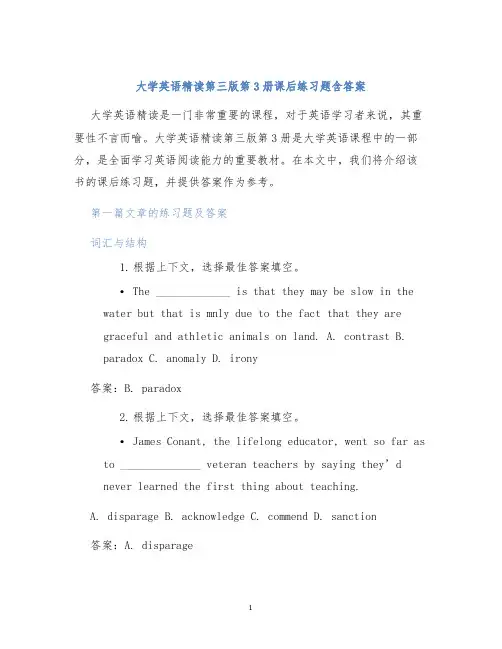
大学英语精读第三版第3册课后练习题含答案大学英语精读是一门非常重要的课程,对于英语学习者来说,其重要性不言而喻。
大学英语精读第三版第3册是大学英语课程中的一部分,是全面学习英语阅读能力的重要教材。
在本文中,我们将介绍该书的课后练习题,并提供答案作为参考。
第一篇文章的练习题及答案词汇与结构1.根据上下文,选择最佳答案填空。
•The _____________ is that they may be slow in the water but that is mnly due to the fact that they aregraceful and athletic animals on land. A. contrast B.paradox C. anomaly D. irony答案:B. paradox2.根据上下文,选择最佳答案填空。
•James Conant, the lifelong educator, went so far as to ______________ veteran teachers by saying they’dnever learned the first thing about teaching.A. disparageB. acknowledgeC. commendD. sanction答案:A. disparage阅读理解1.根据文章内容,选择最佳答案。
•According to the passage, _____________.A. pelicans are graceful and athletic animalsB. pelicans are slow in both the water and on landC. pelicans are slow in the water but are athletic animals on landD. pelicans are very fast swimmers but struggle on land答案:C. pelicans are slow in the water but are athletic animals on land2.根据文章内容,选择正确的答案。
大学英语精读董亚芬Book1-Unit4课后练习完整答案
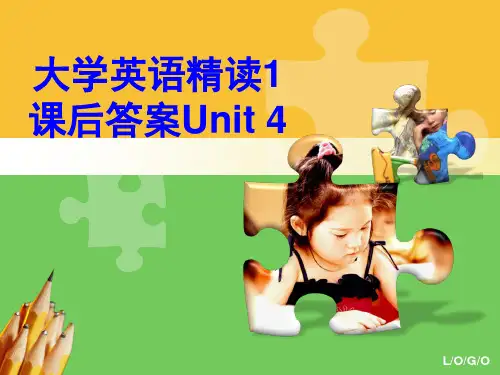
Ⅲ. Vocabulary Activities 4.
1) Ted is expected to _____________________________ come up with some good solution after he has considered the problem. (come up with) 2) I hear young people under 18 _________________ are prohibited from buying cigarettes in that country (prohibit) 3) Taking responsibility for yourself is part of the process of __________. growing up (grow) 4) Efforts to _____________________ bring together people of different races and cultures have not met with complete success. (bring together) 5) The United States experience a sharp rise in its birth rate after the Second World War, known ______________ as the “baby boom”. (rate) in part to the drought. (part) 6) The crop failure was due _______
shows
10) we had a ball
j. produce
Ⅲ. Vocabulary Activities 2.
第三版大学英语精读课后练习答案
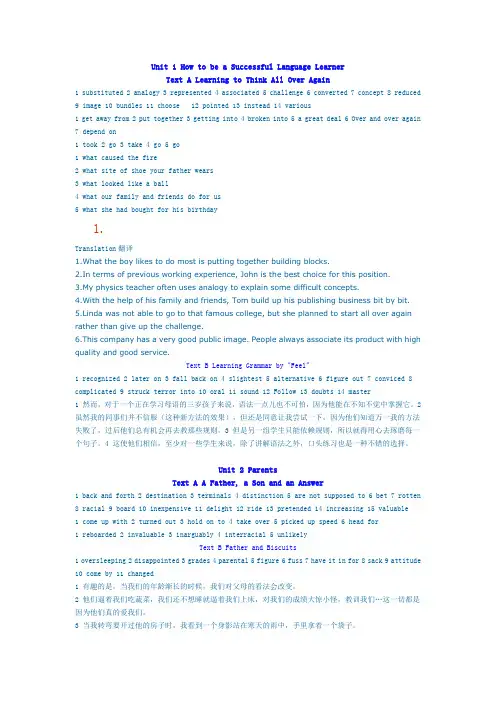
Unit 1 How to be a Successful Language LearnerText A Learning to Think All Over Again1 substituted2 analogy3 represented4 associated5 challenge6 converted7 concept8 reduced9 image 10 bundles 11 choose 12 pointed 13 instead 14 various1 get away from2 put together3 getting into4 broken into5 a great deal6 Over and over again7 depend on1 took2 go3 take4 go5 go1 what caused the fire2 what site of shoe your father wears3 what looked like a ball4 what our family and friends do for us5 what she had bought for his birthday1.Translation翻译1.What the boy likes to do most is putting together building blocks.2.In terms of previous working experience, John is the best choice for this position.3.My physics teacher often uses analogy to explain some difficult concepts.4.With the help of his family and friends, Tom build up his publishing business bit by bit.5.Linda was not able to go to that famous college, but she planned to start all over again rather than give up the challenge.6.This company has a very good public image. People always associate its product with high quality and good service.Text B Learning Grammar by "Feel"1 recognized2 later on3 fall back on4 slightest5 alternative6 figure out7 conviced8 complicated9 struck terror into 10 oral 11 sound 12 Follow 13 doubts 14 master1 然而,对于一个正在学习母语的三岁孩子来说,语法一点儿也不可怕,因为他能在不知不觉中掌握它。
大学英语精读第三版第三册课后习题答案(精心汇编)
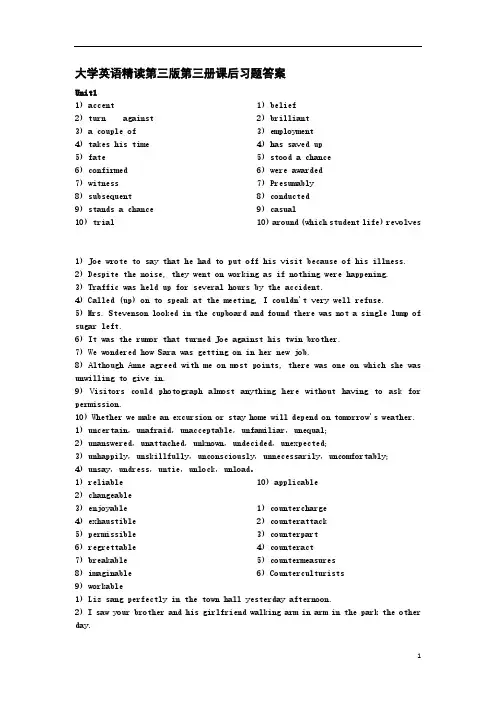
大学英语精读第三版第三册课后习题答案Unit11) accent2) turn against3) a couple of4) takes his time5) fate6) confirmed7) witness8) subsequent9) stands a chance10) trial 1) belief2) brilliant3) employment4) has saved up5) stood a chance6) were awarded7) Presumably8) conducted9) casual10) around (which student life) revolves1) Joe wrote to say that he had to put off his visit because of his illness.2) Despite the noise, they went on working as if nothing were happening.3) Traffic was held up for several hours by the accident.4) Called (up) on to speak at the meeting, I couldn't very well refuse.5) Mrs. Stevenson looked in the cupboard and found there was not a single lump of sugar left.6) It was the rumor that turned Joe against his twin brother.7) We wondered how Sara was getting on in her new job.8) Although Anne agreed with me on most points, there was one on which she was unwilling to give in.9) Visitors could photograph almost anything here without having to ask for permission.10) Whether we make an excursion or stay home will depend on tomorrow's weather.1) uncertain,unafraid,unacceptable,unfamiliar,unequal;2) unanswered,unattached,unknown,undecided,unexpected;3) unhappily,unskillfully,unconsciously,unnecessarily,uncomfortably;4) unsay,undress,untie,unlock,unload。
大学英语精读第二册课后习题答案
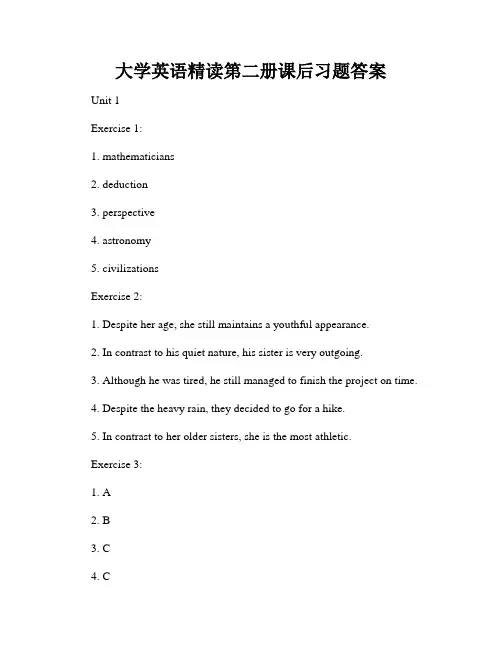
大学英语精读第二册课后习题答案Unit 1Exercise 1:1. mathematicians2. deduction3. perspective4. astronomy5. civilizationsExercise 2:1. Despite her age, she still maintains a youthful appearance.2. In contrast to his quiet nature, his sister is very outgoing.3. Although he was tired, he still managed to finish the project on time.4. Despite the heavy rain, they decided to go for a hike.5. In contrast to her older sisters, she is the most athletic.Exercise 3:1. A2. B3. C4. C5. AExercise 4:1. is derived from2. make sense3. consists of4. go beyond5. based onUnit 2Exercise 1:1. influential2. surgeon3. guarantee4. tremendous5. revealedExercise 2:1. Despite his busy schedule, he always finds time for his family.2. Although the road was blocked, they managed to find an alternative route.3. In contrast to the previous model, the new car is more fuel-efficient.4. Despite the difficulties, they never gave up.5. In contrast to her siblings, she is the most talented. Exercise 3:1. B2. B3. C4. C5. AExercise 4:1. take into account2. result in3. come up with4. play a role5. aim atUnit 3Exercise 1:1. exceptional2. rivals3. version4. translate5. perceptionExercise 2:1. Despite the storm, they managed to reach their destination safely.2. Although she was tired, she continued to study until late at night.3. In contrast to her classmates, she always arrives early to class.4. Despite the challenges, they remained determined to succeed.5. In contrast to her colleagues, she is the most experienced. Exercise 3:1. B2. A3. C4. A5. CExercise 4:1. focus on2. take for granted3. result in4. carry out5. lead toUnit 4Exercise 1:1. pioneers2. participants3. highlight4. efficiency5. potentialExercise 2:1. Despite their differences, they managed to work together effectively.2. Although she was nervous, she gave a flawless performance.3. In contrast to his friends, he prefers to stay at home and read.4. Despite the criticism, the artist continued to pursue his unique style.5. In contrast to her teammates, she is the most dedicated.Exercise 3:1. C2. B3. A4. C5. BExercise 4:1. result in2. pay attention to3. be exposed to4. go against5. give rise to以上是大学英语精读第二册课后习题的答案。
大学英语精读第三版第一册课后习题全部答案
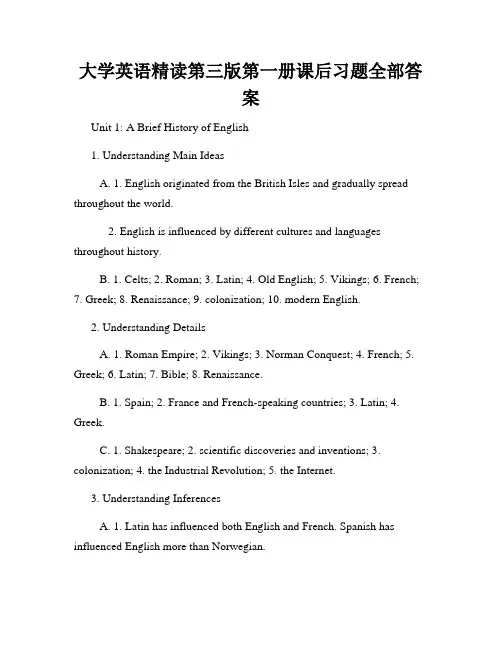
大学英语精读第三版第一册课后习题全部答案Unit 1: A Brief History of English1. Understanding Main IdeasA. 1. English originated from the British Isles and gradually spread throughout the world.2. English is influenced by different cultures and languages throughout history.B. 1. Celts; 2. Roman; 3. Latin; 4. Old English; 5. Vikings; 6. French;7. Greek; 8. Renaissance; 9. colonization; 10. modern English.2. Understanding DetailsA. 1. Roman Empire; 2. Vikings; 3. Norman Conquest; 4. French; 5. Greek; 6. Latin; 7. Bible; 8. Renaissance.B. 1. Spain; 2. France and French-speaking countries; 3. Latin; 4. Greek.C. 1. Shakespeare; 2. scientific discoveries and inventions; 3. colonization; 4. the Industrial Revolution; 5. the Internet.3. Understanding InferencesA. 1. Latin has influenced both English and French. Spanish has influenced English more than Norwegian.B. 1. The French-speaking Normans ruled England after the Norman Conquest. French vocabulary entered English as a result.C. 1. The colonization of America and the spread of the British Empire promoted the use of English worldwide.4. Understanding VocabularyA. 1. E; 2. E; 3. C; 4. D; 5. B; 6. C; 7. A; 8. E; 9. B; 10. D; 11. C; 12. A;13. A; 14. C; 15. D; 16. B.B. 1. evolution; 2. consolidation; 3. influx; 4. prosperity; 5. dominance;6. expansion;7. fluctuations;8. prevalence.Unit 2: Cultural Differences and Cultural Shock1. Understanding Main IdeasA. 1. Cultural differences can lead to misunderstandings and conflicts.2. Cultural shock is a common experience for people in a new cultural environment.B. 1. cultural differences; 2. culture shock.2. Understanding DetailsA. 1. The way people greet each other; 2. Personal space; 3. Eye contact; 4. Time orientation.B. 1. etiquette; 2. gestures; 3. customs; 4. lifestyles; 5. values.3. Understanding InferencesA. 1. Expectations and behaviors vary across different cultures.B. 1. It is essential to understand and adapt to a new culture to avoid misunderstandings and conflicts.4. Understanding VocabularyA. 1. C; 2. A; 3. E; 4. C; 5. D; 6. B; 7. E; 8.B.B. 1. perception; 2. encounter; 3. adapt; 4. reverse; 5. undergo.Unit 3: The Beginnings of Isolation1. Understanding Main IdeasA. 1. The narrator's solitude on the island gives him a sense of freedom and empowerment.2. The narrator is concerned about the presence of "wild things" on the island.B. 1. solitude; 2. wild things.2. Understanding DetailsA. 1. The narrator occupies himself with building, exploring, and observing nature on the island.B. 1. The narrator feels like the "king" of the island and enjoys the freedom it brings.2. The narrator is cautious about the "wild things" and their potential threat to him.3. Understanding InferencesA. 1. The narrator's newfound solitude allows him to escape the restrictions and expectations of society.B. 1. The narrator's isolation might lead to psychological challenges and fear.4. Understanding VocabularyA. 1. A; 2. D; 3. B; 4. E; 5. C; 6. D; 7. A; 8.B.B. 1. solitude; 2. companionship; 3. survival; 4. vulnerability.。
大学英语精读第二册课后习题答案
大学英语精读第二册课后习题答案大学英语精读第二册课后习题答案Introduction:大学英语精读第二册是大学英语教材中的一本重要教材,它涵盖了许多重要的英语语法和词汇知识。
课后习题是巩固学生对课堂内容的理解和应用的重要途径。
本文将为读者提供大学英语精读第二册课后习题的答案,帮助读者更好地掌握英语知识。
Part I: Vocabulary and Structure1. Fill in the blanks with the appropriate form of the words given.a) determinationb) abandonedc) knowledgeabled) rejectione) productivef) accessibilityg) accuratelyh) questionablei) awkwardlyj) convincing2. Choose the word or phrase that best completes each sentence.a) Cb) Ac) Bd) De) Cf) Bg) Dh) Ai) Cj) BPart II: Reading Comprehension1. Answer the following questions.a) The passage mainly discusses the differences between spoken and written language.b) Spoken language is often characterized by more informal and interactive features, such as slang, contractions, and interruptions. Written language, on the other hand, tends to be more formal and structured, with complete sentences and proper grammar.c) The author believes that both spoken and written language are important for effective communication. Spoken language allows for immediate feedback and interaction, while written language allows for careful thought and revision.d) The passage suggests that the distinction between spoken and written language is not always clear-cut, as there are various forms of communication that fall in between, such as texting and online chatting.e) The passage emphasizes the importance of being able to adapt one's language to different contexts and audiences. It suggests that being proficient in both spoken and written language is essential for effective communication.2. Choose the best answer.a) Bb) Dc) Ad) Ce) Bf) Dg) Ah) Ci) Bj) DPart III: Cloze1. Fill in the blanks with the appropriate words.a) atb) thatc) tod) ane) forf) ing) onh) ofi) withj) as2. Choose the word or phrase that best completes each sentence.a) Ab) Cc) Bd) De) Cf) Ag) Bh) Di) Cj) AConclusion:本文提供了大学英语精读第二册课后习题的答案,帮助读者更好地巩固和应用所学的英语知识。
大学英语精读第三册课后习题答案
大学英语精读第三册课后习题答案大学英语精读第三册课后习题答案导言:大学英语精读第三册是一门非常重要的课程,通过学习这门课程,我们可以提高我们的英语阅读能力和理解能力。
然而,课后习题对于巩固所学知识,提高学习效果非常重要。
在本文中,我将为大家提供大学英语精读第三册课后习题的答案,希望能够帮助大家更好地学习和掌握这门课程。
第一章:文化交流1. What are the three main reasons why people travel?People travel for various reasons, but the three main reasons are for leisure, business, and education. Leisure travel allows people to relax and explore new places. Business travel is for work-related purposes such as meetings and conferences. Education travel involves studying abroad or attending international academic events.2. How does travel contribute to cultural exchange?Travel contributes to cultural exchange by exposing individuals to different cultures, traditions, and customs. Through travel, people can learn about and appreciate the diversity of the world. They can also share their own culture with others, promoting understanding and mutual respect.3. What are the advantages and disadvantages of package tours?Package tours offer convenience and ease of travel, as everything is prearranged. They often include transportation, accommodation, and guided tours. However,the main disadvantage is the lack of flexibility. Travelers have limited freedom to explore on their own and may feel rushed during the scheduled activities.第二章:科技与社会1. How has technology changed the way we communicate?Technology has revolutionized communication by providing various means of instant communication. We can now easily connect with others through phone calls, text messages, emails, and social media platforms. Technology has also made long-distance communication more accessible and affordable.2. What are the positive and negative effects of social media?Social media has greatly enhanced connectivity and information sharing. It allows people to stay connected with friends and family, share their thoughts and experiences, and access news and entertainment. However, it also has negative effects such as addiction, privacy concerns, and the spread of misinformation.3. How has technology influenced the job market?Technology has both created and eliminated jobs. On one hand, it has created new job opportunities in fields such as software development, data analysis, and digital marketing. On the other hand, it has led to the automation of many tasks, resulting in job losses in industries like manufacturing and customer service.第三章:教育与学习1. What are the benefits of studying abroad?Studying abroad provides students with the opportunity to immerse themselvesin a different culture, learn a new language, and gain a global perspective. It also enhances personal growth, independence, and cross-cultural communication skills. Additionally, studying abroad can broaden career opportunities and make individuals more competitive in the job market.2. What are the challenges of online learning?Online learning offers flexibility and convenience, but it also presents challenges. Some of these challenges include the lack of face-to-face interaction with instructors and peers, potential distractions at home, and the need for self-discipline and time management skills. Technical issues and limited access to resources can also be obstacles.3. How can teachers promote effective learning in the classroom?Teachers can promote effective learning by creating a positive and inclusive learning environment. They should encourage active participation, critical thinking, and collaboration among students. Providing clear instructions, constructive feedback, and diverse learning materials can also enhance the learning experience.。
大学英语精读课后习题
1.idle adj.闲置的;懒惰的;停顿的 vt.虚度;使空转 vi.无所事事;虚度;空转Average students who work hard usually do better than clever students who are idle.通常努力工作的学生比聪明却懒惰的学生做得更好。
2.wield vt. 使用;行使;挥舞had her car windows smashed by a gang wielding baseball bats。
的车窗被一群挥舞着棒球棒的暴徒砸碎了。
3.adapt vi. 适应 vt. 使适应;改编The world will be different,and we will have to be prepared to adapt to the change。
世界将会变得不同,我们将不得不做好准备以适应这种变化。
4.donate vt. vi. n. 捐赠;捐献It seems that more and more people are willing to donate their organs for use after death。
似乎越来越多的人愿意死后捐献自己的器官5.scratch vt. 抓;刮;挖出;乱涂 n. 擦伤;抓痕;刮擦声;乱写adj. 打草稿用的;凑合的;碰巧的 vi. 抓;搔;发刮擦声;勉强糊口;退出比赛Ralph got scratched all over when he was running through the bushes。
拉尔夫在通过灌木丛的时候浑身都被刮伤了6.swing vt. 使旋转;挥舞;悬挂 vi. 摇摆;转向;悬挂;大摇大摆地行走n. 摇摆;摆动;秋千;音律;涨落 adj. 旋转的;悬挂的;强节奏爵士音乐的the idle young man lit a cigarette and sat on the end of the table,one leg swinging。
大学英语精读第三版第1册课后练习题含答案
大学英语精读第三版第1册课后练习题含答案简介大学英语精读第三版第1册是中国大学英语教材的一部分,是为大学英语专业的本科生编写的一本英语教材。
本文主要为大学英语精读第三版第1册课后练习题的答案提供参考,以供学习者学习和实践。
第1章综述第1节 Reading Skills课后练习题1.What can you achieve by previewing a reading material?You can get an idea of the overall content, organization, mn idea, and purpose of the reading material.2.How is skimming different from scanning?Skimming is reading through a text quickly to get a general idea of the content. Scanning is reading a text quickly to find specific info rmation.第2节 Pre-reading and Predicting课后练习题1.What can you do before reading a passage to help youunderstand it better?You can use your prior knowledge, ask questions, and predict the content and the structure of the passage.2.What can predictions do?Predictions can motivate you to read carefully and attentively, h elp you understand and retn information more easily, and improve your re ading comprehension.第3节 Identifying the Mn Idea课后练习题1.What is the mn idea of the passage?The mn idea is the most important idea or message that the author wants to convey, and it usually appears in the topic sentence or thesis statement of the passage.2.What are some ways to identify the mn idea of a passage?You can identify the topic, the scope, the purpose, and the suppo rting detls of the passage, and summarize them into a sentence or a phra se that expresses the author's mn idea.第2章阅读与写作第1节 Finding the Topic Sentence课后练习题1.What is a topic sentence?A topic sentence is a sentence that expresses the mn idea or focus of a paragraph, and usually appears at or near the beginning of the pa ragraph.2.How can you find the topic sentence of a paragraph?You can look for signals such as transitional words and phrases, repetition, summary, or explicit statement that introduce, summarize, or highlight the mn topic of the paragraph.第2节 Supporting Detls课后练习题1.What are supporting detls?Supporting detls are specific examples, evidence, facts, reasons, or explanations that support and elaborate on the mn idea or topic of a paragraph.2.What is the difference between a general statement and aspecific example?A general statement is a statement that applies to a broad category or concept, while a specific example is a concrete instance or detl t hat exemplifies or illustrates the general statement.第3节 Writing Effective Paragraphs课后练习题1.What are the three mn parts of a paragraph?The three mn parts of a paragraph are the topic sentence, the sup porting detls, and the concluding sentence.2.What are some guidelines for writing effective paragraphs?Some guidelines for writing effective paragraphs are to organize your ideas logically, use topic sentences and supporting detls, provide transitions, use descriptive language and sensory detls, vary your sentence structure and length, and conclude with a suggestion, a prediction, or a thought-provoking question.结语大学英语精读第三版第1册的课后练习题旨在帮助学习者巩固和深化课堂所学的英语阅读、理解、分析和写作技能。
- 1、下载文档前请自行甄别文档内容的完整性,平台不提供额外的编辑、内容补充、找答案等附加服务。
- 2、"仅部分预览"的文档,不可在线预览部分如存在完整性等问题,可反馈申请退款(可完整预览的文档不适用该条件!)。
- 3、如文档侵犯您的权益,请联系客服反馈,我们会尽快为您处理(人工客服工作时间:9:00-18:30)。
1.idle adj.闲置的;懒惰的;停顿的 vt.虚度;使空转 vi.无所事事;虚度;空转Average students who work hard usually do better than clever students who are idle.通常努力工作的学生比聪明却懒惰的学生做得更好。
2.wield vt. 使用;行使;挥舞had her car windows smashed by a gang wielding baseball bats。
的车窗被一群挥舞着棒球棒的暴徒砸碎了。
3.adapt vi. 适应 vt. 使适应;改编The world will be different,and we will have to be prepared to adapt to the change。
世界将会变得不同,我们将不得不做好准备以适应这种变化。
4.donate vt. vi. n. 捐赠;捐献It seems that more and more people are willing to donate their organs for use after death。
似乎越来越多的人愿意死后捐献自己的器官5.scratch vt. 抓;刮;挖出;乱涂 n. 擦伤;抓痕;刮擦声;乱写adj. 打草稿用的;凑合的;碰巧的 vi. 抓;搔;发刮擦声;勉强糊口;退出比赛Ralph got scratched all over when he was running through the bushes。
拉尔夫在通过灌木丛的时候浑身都被刮伤了6.swing vt. 使旋转;挥舞;悬挂 vi. 摇摆;转向;悬挂;大摇大摆地行走n. 摇摆;摆动;秋千;音律;涨落 adj. 旋转的;悬挂的;强节奏爵士音乐的the idle young man lit a cigarette and sat on the end of the table,one leg swinging。
那个悠闲的年轻男子点了一支烟,坐在桌上,一条腿摆来摆去。
7.sideways adj. 向侧面的;一旁的 adv. 向侧面地;向一旁if you would move sideways to the left,I can get everyone on the picture。
如果你能往左边移一下,我就可以让每个人都出现在画面中。
8.plot . 密谋;绘图;划分;标绘 n. 情节;图;阴谋we’re plotted our projected costs for the coming year,and they show a big increase。
我们在策划未来一年的计划成本,显示的结果是大幅增加9.kneel vi. 跪下,跪Jane knelt down to pull a weed from the flowerbed。
简从花圃跪下来把杂草除掉。
10.recycle vt. vi. n. 再循环;重复利用companies are now trying to recycle their waste or find other ways of disposing of their by-products。
公司现在正试图将他们的废料回收或找到其他的方式处理他们的副产品11.tag n. 标签;名称;结束语;附属物 vt.尾随,紧随;连接;起浑名;添饰 vi. 紧随where’s the price tag on this dress这件衣服的价格标签在哪儿12.executive n. 总经理;执行委员会;执行者;经理主管人员 adj. 行政的;经营的;执行的,经营管理的Amy is now a senior executive having worked her way up through the company。
Amy通过自己的努力,现在已经是公司的一名高级管理人员了。
13.outlet n.出口,排放孔;[电] 电源插座;销路;发泄的方法;批发商店the water could not get away from the tank because the outlet was blocked。
水不能从水槽放出去,因为出口被堵住了14.cluster n. 群;簇;丛;串 vt. 聚集; vi. 群聚;丛生something must have happened;office workers were seen clustered at every open door,taking excitedly。
一定是有什么事情发生了,因为可以看到工作的人们在每一扇开门处兴奋地聚集着。
15.have a hard/difficult time(doing)度过困难时刻;过得困难;步履艰难the injured old lady had a hard time getting to the hospital。
受伤的那位老太太很难到达医院16.clean up 清理,扫除,大捞一笔she’d spilt some coffee and was cleaning it up just as John walked in。
她洒出了一些咖啡,当约翰走进来的时候她正在清理。
17.run out of 用完,耗尽by the time they got to the camp they’d run out of water。
他们到达营地的时候他们的水也会耗尽。
18.exemplify vt例证the painting perfectly exemplifies the naturalistic style which was so popular at the time这幅画是如此受欢迎,它完美地展示了自然的风格。
19.thrive vi. 繁荣,兴旺;茁壮成长20.tackle vt.处理;抓住;固定;与…交涉 n.滑车;装备;用具;扭倒 vi.扭倒;拦截抢球21.yield vt. 屈服;出产,产生;放弃 vi. 屈服,投降n. 产量;收益22.choke vt. 呛;窒息;阻塞;抑制;扑灭 n. [动力] 阻气门 vi.窒息;阻塞;说不出话来23.turn(a)round 转向反方向;(生意或经济) 好转24.here and now此时此地;立刻25.shabby 破败的寒酸的卑鄙的;吝啬的;低劣的26.stride vt,vi,n 跨过;大步行走27.pathetic 可怜的,悲哀的;感伤的;乏味的28.at risk处于危险中29.give away 放弃;泄露;分发;出卖;赠送30.on faith 不加怀疑地;单凭信仰;依赖地31.quote 报价;引用;举证32.peel 剥落;削词组:Pick at:吃得很少;挑毛病;指责He was no very hungry, and just <picked at> the food on his plate.他不是很饿,所以只是在他的盘子里挑一些食物吃Pick up:捡起;获得;收拾;不费力地学会The young man turned over to the police the wallet he had <picked up> in the street.那个年轻人把在街上捡到的钱包交给了警察。
He <picked up> the knowledge of radio just by staying around the radio station. 他只是通过在电台附近逗留而获得无线电知识。
It’s not safe to stand at the roadside hoping to <be picked up> by passing motorists.站在路边搭过路车不安全。
Pick on:挑选;选中;批评;欺负I objected to <being picked on> for such an unpleasant job.我反对被选中去做这样一件不愉快的工作。
There is no need to <pick on> him all day long; he is a child after all.没有必要整天挑剔批评他,毕竟他还是个孩子Pick out:挑选出;辨认出She has such a distinctive appearance that I could <pick her out> anywhere.她有这样一个与众不同的外表,我可以在任何地方把她认出来。
The director finds it difficult to <pick out> the best actors for his play, they are all so good.导演发现很难选出可以演这部剧的最好的演员,他们都很好It is usually easier to <pick out> the meaning of a sentence in a given context.在特定的上下文中,通常容易地挑出句子的意思.Get across:vi. 通过;使...被理解The overseas teacher <got his points across> to his Chinese colleagues with the help of gestures.这位海外老师借助手势向他的中国同事表达了他的观点.Get along:(勉强)生活;进展;(使)前进;与…和睦相处How is Mr. Holmes <getting along> in his new job福尔摩斯先生的新工作进展得怎么样Mike is ill-tempered. He doesn’t <get along> with anybody in the office.迈克脾气很坏,他和办公室里的任何人都合不来。
get over克服;恢复;熬过;原谅Miss Green returned to work after she <got over> her illness.格林小姐在病好之后恢复了工作。
The committee will have to find means to<get over> the financial difficulties.委员会必须找到办法克服财政困难get down下来;吞下;使沮丧Here is a telephone message I <got down> for you.这是我给你打下来的电话留言。
